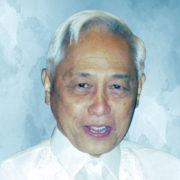On August 31, 2012, Asia’s Nobel Prize, the Ramon Magsaysay Award, was presented to six Asians during the Presentation Ceremonies on at the Philippine International Convention Center in Pasay City. The only Filipino awardee was DOST Academician Romulo G. Davide, 78, who was cited by the Ramon Magsaysay Award Foundation, for “his steadfast passion in placing the power and discipline of science in the hands of Filipino farmers, who have consequently multiplied their yields, created productive farming communities, and rediscovered the dignity of their labor.” Romulo has been helping farmers increase production through scientific methods to fight pests and crop diseases.
As an older brother to the more prominent, retired Supreme Court Chief Justice Hilario Davide Jr., (who was also a Ramon Magsaysay Awardee for government service in 2002), Romulo was reportedly surprised to learn that he would be given such an honor. But for those who know the humble and outstanding scientist and professor, it was well-deserved.
As one of the country’s top scientists, Romulo is known as the “Father of Plant Nematology.” His groundbreaking research on nematode pests, that destroy agricultural crops, enriched Philippine nematology and earned him international recognition and the distinction for being the first Filipino to be included in the ‘Who’s Who’ of nematology.
‘No barren soils, only barren minds’
Born to a poor family in Argao, Cebu on March 14, 1934, Romulo has been passionate about helping farmers since he was young. His father, Hilario Davide Sr. ( a public school teacher) taught Romulo and his siblings the value of education, how to tend the farm, till the soil and raise livestock.
“There are no barren soils, only barren minds,” Hilario Sr. would tell his children. He made sure they did well in their education.
Romulo acquired a Bachelors Degree in Agriculture at the University of the Philippines, Los Baños in April 1957, an MD in Nematology from the Oklahoma State University (1962), and his Ph.D in Nematology and Plant Pathology from the North Carolina State University (1966).
He then became a Professor in the University of the Philippines, Los Baños (UPLB) where he led the nematology undergraduate and graduate courses. He was elected member of the National Academy of Science and Technology Philippines in 2002; was a member of the Board of Regents, the highest policy-making body of the University of the Philippines from 2005-2009; and is now Professor Emeritus at UPLB.
Breakthroughs and discoveries
According to the DOST website, Romulo’s researches on the cultural and biological control of nematodes have provided the Filipino farmers effective tools against nematodes, thereby increasing yield and income. Romulo developed the first Philippine biological control agent called Biocon that can be used against nematode pests attacking vegetables, banana, potato, citrus, pineapple, and rice, among others. The product is an essential practical substitute for highly toxic and expensive chemical nematicides.
He conducted “a 16-year research on nematode survey, identification, host-parasite relationship and interaction with other plant pathogens. This resulted to the discovery of the fungus called Paecilomyces lilacinus, which feeds on parasitic nematodes, nematode eggs, and larvae on plants. The fungus was developed as BIOACT, the first Philippine biological control product that prevents root-rotting and gall-farming plant parasitic nematodes that attack various vegetable and fruit plantations such as potato, banana, citrus, pineapple, rice, etc,” says WikiPilipinas.org.
Romulo “also discovered various nematodes including Tylenchulus semipenetrans, a major cause of citrus disease in the Philippines; Radopholus similis, which destroys cavendish banana plantations in Davao; and Meloidogyne incognita, which attacks tomatoes, bitter gourd, and eggplant,” enumerated WikiPilipinas.org further.
Awards and accolades
For his numerous scientific achievements, Romulo has received 47 significant national and international awards and citations. These include the ASEAN Achievement Award for Research and Development from the ASEAN Business Forum in Bangkok, Thailand in 1993; the Jose Rizal Pro Patria Gold Medal Award and Presidential Citation as Outstanding Agricultural Scientist from the Department of Agriculture and former President Fidel Ramos in 1994; the Outstanding Scientist Award in Nematology and Plant Pathology from the Department of Science and Tech., Region 7 in 1994; the Recognition Award for Outstanding Contribution to Agricultural Development in Asia from the Asian Agricultural Research Development Fund Ltd Hongkong in 1995; the Concepcion D. Dadufalza Award for Distinguished Achievement from the University of the Philippines Diliman in 2002; and the Distinguished Award in Agriculture, given by the Gamma Sigma Delta International Society of Agriculture in 2007; the Lingkod Bayan Award from the Civil Service Commission in 2006; Outstanding Contribution to Agriculture Development in Asia from the Asian Agricultural Research Development Fund Ltd. in Hong Kong, and the Gregorio Y. Zara Award for Applied Science by the Philippine Association for the Advancement of Science, Inc. (1986).In 1994, when Davide received the Gawad Saka Outstanding Agricultural Scientist Award, he used the P500,000 grant to fund the establishment of the Farmer-Scientists Training Program(FSTP) for Sustainable Agriculture Development. The goal of FSTP has been to target poverty and reduce hunger among Filipino farmers. Romulo said the program sought to teach farmers the scientific way of farming in order to increase productivity.
Romulo selected his hometown, Barangay Colawin in Argao, as the pilot area. From 74 farmers in Colawin, the program spread to 35 towns in Cebu and 6 other provinces by 2007. The farmers’ productivity, as well as their entrepreneurial capability, greatly improved. Through his leadership and initiatives, this program is now adapted nationwide.
Other training sessions don’t provide farmers seedlings, according to Romulo. But in the FSTP, high-yielding varieties of corn, sweet potato, peanuts and other crops are given to the farmers.
The Ramon Magsaysay Foundation recognizes the essence of FTSP as “an innovative and multi-faceted program” that aims to turn farmers into scientists who would be able to do experiments, discover effective techniques, manage the market and increase production.
“You give the farmers the dignity of being farmers,” Romulo said. “Our farmers deserve such a recognition being real heroes of the country.”
The country’s real heroes
Married to retired Prof. Clara L. Davide, Romulo said the award would inspire him to do more for the farmers whom he believed were the country’s real heroes.
“We have to take care of our farmers. With the Ramon Magsaysay Award, we will be more inspired and encouraged to continue the ideals and spirit of (the late) President Ramon Magsaysay. It will inspire us to do more,” he said. “With the award, we will be able to expand the program. More will support us,” he added.
Romulo vowed to uphold the ideals of former President Ramon Magsaysay who had championed the causes of the masses, especially the farmers.
“(The farmers) are the real heroes of the land. Without the farmers, what will we eat?” he said.
Thanking God for His blessings, Romulo told The Sun Star Cebu, “Pagbuot gyud ni sa Ginoo, wala gyud ko nagdahum (I didn’t expect this. This is God’s will). I’m just doing His work on earth.”
(LA Weekend September 1-4, 2012 Sec A pg. 10)







